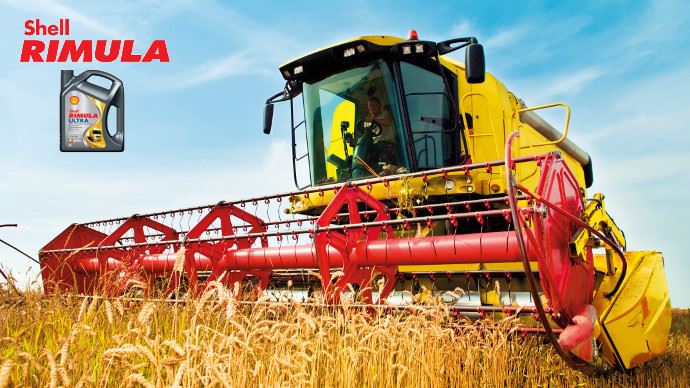Over the last 117 years South Africans have entrusted Shell to make life’s journey more comfortable and convenient – a little better every day. The company’s illustrious history in the country is testament to its commitment in building the nation, and as such, its pledge to support the agriculture sector will continue to grow.
In an environment where meeting demand by maximising productivity and minimising costs is key, making the most of the ‘off season’ to conduct proper equipment maintenance is essential to help avoid costly unplanned downtime during peak planting or harvest times.
However, the potential impact of effective equipment lubrication on equipment durability and reliability is too often underestimated, and according to an international industry study commissioned by Shell Lubricants, only 39% of agricultural companies believe lubrication can influence equipment availability and only 29% understand how wear protection delivered by a lubricant can lead to cost savings.
Perhaps unsurprisingly in light of this, the study also demonstrated that many companies underestimate the potential extent of these savings, with over 60% of those surveyed believing that cost savings linked to lubricants would not exceed 5%. The truth is however that Shell Lubricants has seen that far greater savings are possible and in recent years has delivered close to $2 million in savings to agriculture customers.
“For decades, Shell Lubricants has worked closely with customers to help identify opportunities to reduce maintenance costs and enhance equipment productivity by upgrading lubrication,” explains Anton Niemann, General Manager Lubricants Sales at Shell Downstream South Africa. “There are two equally important elements to seizing this opportunity. The first is selecting the right lubricant or grease; the second is effective lubrication management.”
However, with the recent droughts playing havoc with the agriculture sector, many farmers have looked for ways to cut costs, and often, selecting the correct mechanical lubricants, as well as making use of inferior lubricating products could in fact be detrimental to machinery, and most often leading to downtime and therefore loss of profit.
Selecting the correct lubricant
When evaluating the effect that lubricants have related to TCO, Shell Lubricants considers the end to end impact on maintenance budgets and processes, but also any costs related to lost production during equipment downtime. Therefore, optimising lubrication directly translates into a significant impact on component life, maintenance costs, and unplanned downtime, so it can contribute to cost savings far higher than the price of the lubricant itself.
“Specifically, we believe that the engines, axels, and transmissions of farming equipment provide some of the lubrication challenges in the agricultural sector,” discloses Niemann. “It is vitally important to have in-depth knowledge about the products you are purchasing and using in your machinery. Selecting the right lubricant is an important first step in helping to improve reliability, boost productivity, and lower costs.”
Niemann highlights four main elements associated with engine protection, including protection against deposits, wear control, corrosion protection, and extended oil life.
“The right engine oil helps protect equipment in all conditions, even when operating at maximum load,” says Niemann. “By guarding against wear, deposits and corrosion, it can help enable machinery to operate efficiently in conjunction with reducing the risk of costly unplanned downtime.”
And in the case of modern farming machinery working under higher loads, the demands on transmission lubricants are increasing. The universal transmission oil is, for most farmers, the most vital lubricant. It must successfully lubricate the transmission, wet brakes and hydraulic systems of machines including tractors, diggers and combine harvesters, to help keep equipment running smoothly for longer.
“In this instance we see wear protection as an important element yet again, and by making use of a lubricant that offers high levels of wear protection will safeguard against wear and tear,” he says.
Further, Niemann expounds on the importance of lubricating longevity particularly in transmission oils, where good oxidation resistance can resist degradation and break-down over time, lending to a reduction in the downtime associated with frequent oil changes.
Choosing a less effective lubricant rarely results in immediate equipment failure, however, it can lead to increased maintenance expenses over time. For instance, lower levels of wear or corrosion protection can lead to more rapid degradation of equipment components, resulting in increased maintenance costs from more frequent replacement. These mounting costs can be far greater than the savings from selecting a lower price lubricant. Selecting a lubricant with numerous OEM approvals for multiple applications can also enable businesses to take advantage of economies of scale, which creates an overall reduction in operating costs.
“With only 2-3 months to complete an entire harvest, even a single day of unplanned downtime can be extremely costly,” explains Virginie Chan, Shell Lubricants Global Sector Marketing Manager for Agriculture. “A high-quality lubricant or grease that keeps machinery clean of deposits and effectively protects against wear and corrosion can help extend equipment life, reduce the frequency of breakdowns and increase equipment availability. This can all contribute to improved equipment reliability and decreased maintenance spend.”
Lubricant management
Lubricant management is of utmost importance, with many businesses not realising the potential benefits associated with effective lubrication management .Niemann explains that even the best of products cannot operate and work correctly if it is not applied and maintained correctly, and as such, effective lubrication management is imperative in unlocking TCO savings.
Selecting a less effective lubricant rarely results in immediate equipment failure but can lead to increased maintenance expenses over time. For example, lower levels of wear or corrosion protection can lead to more rapid degradation of equipment components, resulting in increased maintenance costs from more frequent replacement. These mounting costs can be far greater than the savings from selecting a lower price lubricant.
In contrast, a high-quality oil or grease that keeps equipment clean of deposits and effectively protects against wear and corrosion can help extend equipment life, reduce frequency of breakdowns and increase the machine’s availability.

Expanding on this, Niemann highlights six key steps in what the company considers integral to proper lubrication management. These include:
Right storage & handling – the lubricant must be stored in the right conditions and handled correctly to avoid contamination and preserve its key characteristics.
Right place – for the oil or grease to reach the right surface it must be properly applied to the equipment.Right time – the correct frequency of oil change or re-greasing ensures the lubricant reaches the surface at the right time. Delays can result in accelerated wear.
Right amount – the correct volume of lubricant or grease applied and topped up to protect moving parts effectively.
Right monitoring – regular sampling and analysis to ensure the lubricant remains fit for purpose and check for early indications of equipment wear. Inspections also ensure the consistent application of the first four steps. For a complete analysis service, Shell offers LubeAnalyst, its oil condition monitoring service that helps to ensure that your equipment and lubricants are in optimum working order by identifying potential oil or equipment failures before they become critical. This service is designed to help save money and time on maintenance.
Right people – the competence of those who lubricate equipment can greatly affect its positive impact, particularly when it comes to ensuring all the above happens.
Evolving for the future
Committed to delivering value to its customers, Shell Lubricants invests significant resources in the development of new products for the agriculture sector. A network of expert collaborations strengthens the innovation capabilities of Shell Research & Development teams located in Technology Centres in Shanghai, Hamburg and Houston.
Working closely with top global agriculture OEMs, including key transmission and engine manufacturers such as ZF and Deutz, ensures Shell Lubricants products evolve in line with technological and industry advances, such as the introduction of PC-11 in the USA.
Additionally, field trials with customers also help validate functionality in real-life scenarios and steer the development of products that improve performance, productivity and profitability. Shell Lubricants products are either approved or meet the specifications of many of the leading farming equipment OEMs, including: Massey Ferguson, John Deere, ZF, but to name a few.
By 2050, it is projected that the world’s population will have reached 9 billion. Meeting increased demand for safe, healthy and nutritious food, while adhering to strict CO2 emissions requirements, minimising environmental footprint and staying competitive by ensuring cost efficiency will require farmers to maximise equipment productivity and reliability.
“It is for this reason, in addition to continuously supporting customers in the present day, that Shell Lubricants is constantly looking ahead to identify opportunities for the next generation of products and services that will help companies overcome the challenges of the future.
“Our future focus and innovation means that our products remain industry leaders and constantly evolving to meet and exceed the needs of our customers,” concludes Niemann.









